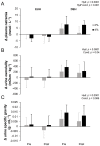Cognitive Performance Before and Following Habituation to Exercise-Induced Hypohydration of 2 and 4% Body Mass in Physically Active Individuals
- PMID: 35267911
- PMCID: PMC8912814
- DOI: 10.3390/nu14050935
Cognitive Performance Before and Following Habituation to Exercise-Induced Hypohydration of 2 and 4% Body Mass in Physically Active Individuals
Abstract
We investigated the effect of repeated exposures to hypohydration upon cognitive performance. In a randomized crossover design, ten physically active adults completed two 4-week training blocks, one where they maintained euhydration (EUH) and the other where they were water-restricted (DEH) during walking/running at 55% V.O2max, 40 °C. Three sessions per week were performed: (1) 1 h of exercise, (2) exercise until 2% or (3) 4% of body mass has been lost or replaced. Limited to the first and fourth training week, a 12 min walking/running time-trial was completed following the 2 and 4% exercise bouts. Trail making, the Wisconsin card sort, the Stop signal task, Simple visual reaction time and Corsi block-tapping tests were performed immediately following the time-trials. Body mass loss was maintained < 1% with EUH and reached 2.7 and 4.7% with DEH following the time-trials. Except for a lower percentage of correct responses (% accuracy) during the Wisconsin card sort test (p < 0.05) with DEH compared to EUH, no statistically significant decline in cognitive performance was induced by low and moderate levels of hypohydration. Compared to week 1, no statistical differences in cognitive responses were observed after repeated exposures to hypohydration (all p > 0.05). From a practical perspective, the gains in cognitive performance following training to DEH were mostly unclear, but under certain circumstances, were greater than when EUH was maintained. Based on the battery of cognitive tests used in the current study, we conclude that whether physically active individuals are habituated or not to its effect, exercise-induced hypohydration of 2 and 4% has, in general, no or unclear impact on cognitive performance immediately following exercise. These results encourage further research in this area.
Keywords: cognitive performance; executive functions; exercise-induced dehydration; hypohydration.
Conflict of interest statement
The authors declare no conflict of interest.
Figures



Similar articles
-
Impact of Repeated Acute Exposures to Low and Moderate Exercise-Induced Hypohydration on Physiological and Subjective Responses and Endurance Performance.Nutrients. 2021 Dec 15;13(12):4477. doi: 10.3390/nu13124477. Nutrients. 2021. PMID: 34960028 Free PMC article.
-
Impact of exercise-induced hypohydration on gastrointestinal integrity, function, symptoms, and systemic endotoxin and inflammatory profile.J Appl Physiol (1985). 2019 May 1;126(5):1281-1291. doi: 10.1152/japplphysiol.01032.2018. Epub 2019 Mar 21. J Appl Physiol (1985). 2019. PMID: 30896356 Clinical Trial.
-
Blinded and unblinded hypohydration similarly impair cycling time trial performance in the heat in trained cyclists.J Appl Physiol (1985). 2019 Apr 1;126(4):870-879. doi: 10.1152/japplphysiol.01026.2018. Epub 2019 Jan 10. J Appl Physiol (1985). 2019. PMID: 30629476
-
Effects of hypohydration and fluid balance in athletes' cognitive performance: a systematic review.Afr Health Sci. 2022 Mar;22(1):367-376. doi: 10.4314/ahs.v22i1.45. Afr Health Sci. 2022. PMID: 36032481 Free PMC article.
-
The effect of active hypohydration on cognitive function: A systematic review and meta-analysis.Physiol Behav. 2019 May 15;204:297-308. doi: 10.1016/j.physbeh.2019.03.008. Epub 2019 Mar 12. Physiol Behav. 2019. PMID: 30876770
Cited by
-
Ad libitum dehydration is associated with poorer performance on a sustained attention task but not other measures of cognitive performance among middle-to-older aged community-dwelling adults: A short-term longitudinal study.Am J Hum Biol. 2024 Jun;36(6):e24051. doi: 10.1002/ajhb.24051. Epub 2024 Feb 14. Am J Hum Biol. 2024. PMID: 38356336 Free PMC article.
-
Repeatability of Ad Libitum Water Intake during Repeated 1 h Walking/Jogging Exercise Sessions Conducted under Hot Ambient Conditions.Nutrients. 2023 Oct 24;15(21):4500. doi: 10.3390/nu15214500. Nutrients. 2023. PMID: 37960153 Free PMC article.
References
Publication types
MeSH terms
Grants and funding
LinkOut - more resources
Full Text Sources
Medical

